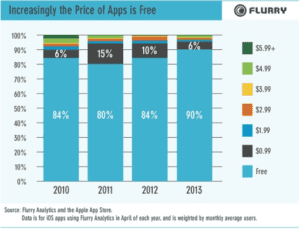Studies that analyze consumer habits have shown in recent years that Apple users are characterized by being rebels with money. That is, they include people who go against the current when it comes to positioning themselves against what has been called "freemium".
Although the name may sound like a joke, the freemium is a business strategy well known to all: offer free services to charge for special or improved ones, free + Premium.
This system, however, seems that it is not ideal to win over many Apple lovers. The iPhone screen is the latest example of people who would pay more for better service. While a third of Android users would buy an iPhone if the screen were larger, the same study (a survey of RBC Capital Markets) reveals that half of consumers who want to change their mobile phone in the next three months, are thinking about buying an iPhone and of them a quarter would pay up to $ 100 more if the screen were larger.
Regardless of whether Apple has taken note of this data and is already preparing the iPhone 6 accordingly, the point is that these opinions reveal the differences between those who consume Android and those who prefer Apple. Although Android users would think about switching to iPhone if it had a bigger screen, the main reason they don't is the price. For Apple the price is not a problem.
Apple users don't give up on “free everything” and are willing to pay if it's worth it. Some even openly declare themselves opposed to “freemium”. In services like music or video in streaming They complain about invasive advertising but put a special emphasis on the gaming industry - yes, it may sound strange but there are who complains that it can be played for free.
The problem with free games is that many sacrifice quality for quantity and, more importantly, that they really aren't free. In the end you end up paying for extras or for the possibility of continuing to evolve in the game so as not to get stuck.
The exception to this type of game freemium would be those that offer a certain possibility of professionalization, which can become more than entertainment. We refer to games like online poker that actually form an industry unto themselves. These applications have no cost; having the possibility of access free tournaments although if you wish you can also compete with real money. A kind of third way that offers the option of spending or not without sacrificing the quality of the game, since the support is the same.
Apple users would be in that third way. Free yes but without conditions; If I am going to have to lose quality, endure unwanted publicity or end up paying anyway, I prefer to do it from the beginning.
Whoever buys Apple knows they want it and how they want it. This graph of Flurry Analytics y Apple App Store demonstrates the spectacular growth of free apps; however, this same survey at the end of last year also indicated that Apple users spent more than three times per app than Android users.
While the average cost per application for Apple fans is 19 cents, Android fans only spend 6, and also those who use iOS buy more. It's something like thinking “if I buy a Ferrari I'm not going to put bad gasoline ”.
To such an extent that this trend affects even services that do not have to do with mobile applications. The Wall Street Journal It unleashed a small media war a couple of years ago, when these consumption habits were beginning to become known, when it published that the Orbitz hotel comparator showed different offers depending on whether the person you were looking for was using Mac or Windows.
The average salary, in the US, of a Mac owner is $ 98.560 for the $ 74.452 that the Windows owner earns. This makes a Mac user willing to pay up to 30% more per night and has a 40% greater chance of booking at 4 or 5 star hotels. So, according to Orbitz, it is not that they did not show the best deals to the Mac but that their searches also showed hotels that the Windows would simply not even consider looking at. In the end it seems that Mac and Windows are more than two operating systems.
